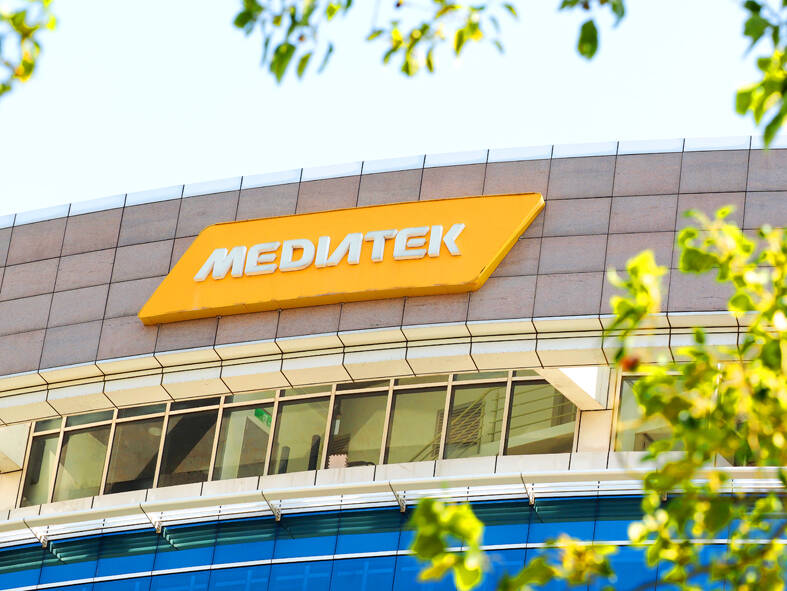MediaTek Inc (聯發科) shares rose yesterday after tech news site The Information reported that Taiwan’s largest chip designer is developing a next-generation artificial intelligence (AI) chip in collaboration with Alphabet Inc’s Google.
The reported partnership with Google comes after MediaTek in January said it had worked with Nvidia Corp to develop a new chip for AI supercomputers.
Shares rose as much as 5 percent early yesterday on the Taiwan Stock Exchange before paring gains to 3.51 percent. That compares with the broader market’s 0.69 percent increase yesterday.

Photo: David Chang, EPA-EFE
The Information on Monday reported that Google is preparing to partner with MediaTek on the next version of its in-house Tensor Processing Unit (TPU) AI chip.
The US tech giant released the sixth-generation TPU at the end of last year and is aiming for the seventh generation next year, the report said, citing people involved in the project.
Google designs its own AI server chips, which it uses for internal research and development, and also rents out to its cloud service customers, while reducing its reliance on Nvidia, the report said.
The company chose MediaTek over Broadcom Inc, which Google has worked with exclusively on AI chips in the past few years, because MediaTek maintains a strong relationship with Taiwan Semiconductor Manufacturing Co (台積電), the world’s largest contract chipmaker, the report added.
In addition, MediaTek charges Google less per chip than Broadcom, it said.
However, Google has not completely severed ties with Broadcom, it added, citing anonymous sources.
Booming demand for AI has fueled growth for global IC designers, with Nvidia topping the sector with an astonishing 125 percent growth in revenue last year to US$124.38 billion, widening its lead over competitors, market researcher TrendForce Corp (集邦科技) said in a report on Monday.
MediaTek was the fifth-largest IC designer in the world last year after revenue rose 19 percent year-on-year to US$16.52 billion, driven by strong performance across smartphones, power management ICs and smart edge solutions, the Taipei-based advisory firm said.
US-based Qualcomm Inc, Broadcom and Advanced Micro Devices Inc were the second, third and fourth-largest IC designers last year, TrendForce said.
The world’s top 10 IC designers generated US$249.8 billion in combined revenue last year, a 49 percent annual increase, it added.

In Italy’s storied gold-making hubs, jewelers are reworking their designs to trim gold content as they race to blunt the effect of record prices and appeal to shoppers watching their budgets. Gold prices hit a record high on Thursday, surging near US$5,600 an ounce, more than double a year ago as geopolitical concerns and jitters over trade pushed investors toward the safe-haven asset. The rally is putting undue pressure on small artisans as they face mounting demands from customers, including international brands, to produce cheaper items, from signature pieces to wedding rings, according to interviews with four independent jewelers in Italy’s main

Japanese Prime Minister Sanae Takaichi has talked up the benefits of a weaker yen in a campaign speech, adopting a tone at odds with her finance ministry, which has refused to rule out any options to counter excessive foreign exchange volatility. Takaichi later softened her stance, saying she did not have a preference for the yen’s direction. “People say the weak yen is bad right now, but for export industries, it’s a major opportunity,” Takaichi said on Saturday at a rally for Liberal Democratic Party candidate Daishiro Yamagiwa in Kanagawa Prefecture ahead of a snap election on Sunday. “Whether it’s selling food or

CONCERNS: Tech companies investing in AI businesses that purchase their products have raised questions among investors that they are artificially propping up demand Nvidia Corp chief executive officer Jensen Huang (黃仁勳) on Saturday said that the company would be participating in OpenAI’s latest funding round, describing it as potentially “the largest investment we’ve ever made.” “We will invest a great deal of money,” Huang told reporters while visiting Taipei. “I believe in OpenAI. The work that they do is incredible. They’re one of the most consequential companies of our time.” Huang did not say exactly how much Nvidia might contribute, but described the investment as “huge.” “Let Sam announce how much he’s going to raise — it’s for him to decide,” Huang said, referring to OpenAI

The global server market is expected to grow 12.8 percent annually this year, with artificial intelligence (AI) servers projected to account for 16.5 percent, driven by continued investment in AI infrastructure by major cloud service providers (CSPs), market researcher TrendForce Corp (集邦科技) said yesterday. Global AI server shipments this year are expected to increase 28 percent year-on-year to more than 2.7 million units, driven by sustained demand from CSPs and government sovereign cloud projects, TrendForce analyst Frank Kung (龔明德) told the Taipei Times. Demand for GPU-based AI servers, including Nvidia Corp’s GB and Vera Rubin rack systems, is expected to remain high,